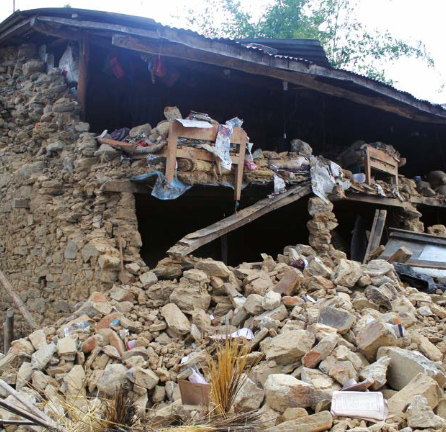Dr. Stephen Coulter (United Mission to Nepal Mental Health Adviser)
 The word trauma means wound; a psychological trauma is a wound to the ‘psyche’ or mind. Our mind can be wounded when it receives an overwhelming amount of distressing information about a distressing event within a short time. The good news is that for the large majority of people, these psychological wounds heal naturally with the support of family and friends within a few weeks or months.
The word trauma means wound; a psychological trauma is a wound to the ‘psyche’ or mind. Our mind can be wounded when it receives an overwhelming amount of distressing information about a distressing event within a short time. The good news is that for the large majority of people, these psychological wounds heal naturally with the support of family and friends within a few weeks or months.
Trauma symptoms protect us from feeling the full enormity of the experience all at once. They only become a problem if they don’t go away when they are no longer needed.Some people, especially those who have immediately taken on a lot of responsibility for others, may have delayed reactions.
The symptoms can be grouped into four categories as follows:
- Intrusive Symptoms, including recurrent involuntary memories, nightmares, flashbacks, feeling upset when reminded of the event and strange sensations or pains in the body.
- Avoidance of things that remind you the event: by trying to block out thoughts about what happened; not wanting to watch the news or read newspapers; and staying away from places and activities associated with the event.
- Changes in thinking and mood, including not remembering some parts of what happened; negative beliefs (e.g., ‘I am bad’, ‘I am to blame’, ‘The world is completely dangerous’); feelings of fear, horror, anger, guilt, or shame; reduced interest in (pre-traumatic) significant activities (e.g. work, hobbies, sports, schoolwork); feeling estranged from other people; and feeling emotionally numb.
- High arousal of the nervous system, including irritable or aggressive behaviour; self-destructive or reckless behaviour; hyper-vigilance; exaggerated startle response; difficulty concentrating; sleep disturbance.
No-one is likely to have all these symptoms, but nearly everyone will experience some of them. Usually, they gradually reduce in intensity and frequency over time.
Trauma responses are not a moral issue or an issue of being tough and brave or weak and cowardly. They are mainly predetermined by our biological drive for survival, our personality and attachment behaviours laid down in early childhood. A traumatic event can,however, raise questions about the meaning of life and the way that a person chooses to live their life, and some people can become preoccupied by these.
Everyone has their own unique experience of the recent earthquake and this, combined with our individual genetic and personality type, means that we are all affected in different ways. However, there are some common features that impact many children, parents and families.
For many children, the world has become a frightening place. They have lost their sense of safety and they want to stay close to parents and relatives. They can regress to the behaviour associated with a younger child and be more naughty and disobedient. Younger children may engage in repetitive destructive drawing and/or play. Older children, due to poor concentration,may underachieve in school. If you have teenagers facing the prospect of important examinations, discuss with them whether they wish to take the exams at present, knowing that they may not do as well as expected, or postpone them to a later date.
Parents may become less available to meet child’s physical and emotional needs (because they are pre-occupied with their own issues); reluctant to let their children go out as usual; and can be tempted to be too lenient in their management of their children’s’ behaviour because they feel sorry for what they have been through.
Family members can feel isolated from each other, finding it difficult to talk about the traumatic event. There can be more arguing due to increased irritability and confusion, because members respond in different ways and recover at different speeds. Of course, some families have lost family members, or have a missing or injured family member, which is deeply distressing.
You can help recovery by loving and caring for those close to you,encouraging talk about what happened, without forcing it or causing hysteria. Try and re-establish normal routines (as far as practicable) and to maintain or recommence good self-care (eating habits, washing, exercise etc.). Make some allowance for your children’s’ behaviour – but still maintain good behavioural boundaries, because this helps them to feel safe.
The fact that many were in their homes when the earthquake struck is a complicating factor. It means that your home may not feel safe and can be a constant reminder of what happened. I spoke with a couple recently who were in the same house when the earthquake started. One said they now thought of the house as the enemy because it scared them, and the other said they thought of it as their friend because it protected them. Even if your house has visible damage, you can still encourage your children to see it as a protector that took some ‘pain and injury’ to save them.
So in conclusion, try not to worry about having trauma symptoms (even though they can be distressing) – just manage or experience them and give it time. You are the best people at present to help your children adjust to this scary event, and your own recovery will help others around you feel that the world is going back to normal. However, if symptoms don’t go away in 6-8 weeks,you may wish to consider seeking professional help.
Visit http://www.umn.org.np/download/507 to get more resources for mental health.
Dr. Stephen Coulter is a qualified Trauma Therapist and Systemic Psychotherapist with 10 years experience of working in a specialist regional trauma centre with children, adults and families affected by psychological trauma. He also has an academic and research interest in responses to traumatic events exercised through his post at Queens University Belfast, UK. The symptoms listed above follow closely those contained in the Diagnostic and Statistical Manual of the American Psychiatric Association (DSM-5, 2013). He has recently come to Nepal to work as a Mental Health Adviser with the United Mission to Nepal. A PowerPoint presentation and information sheet with information similar to the above is freely available from the UMN website for general use.





















Discussion about this post